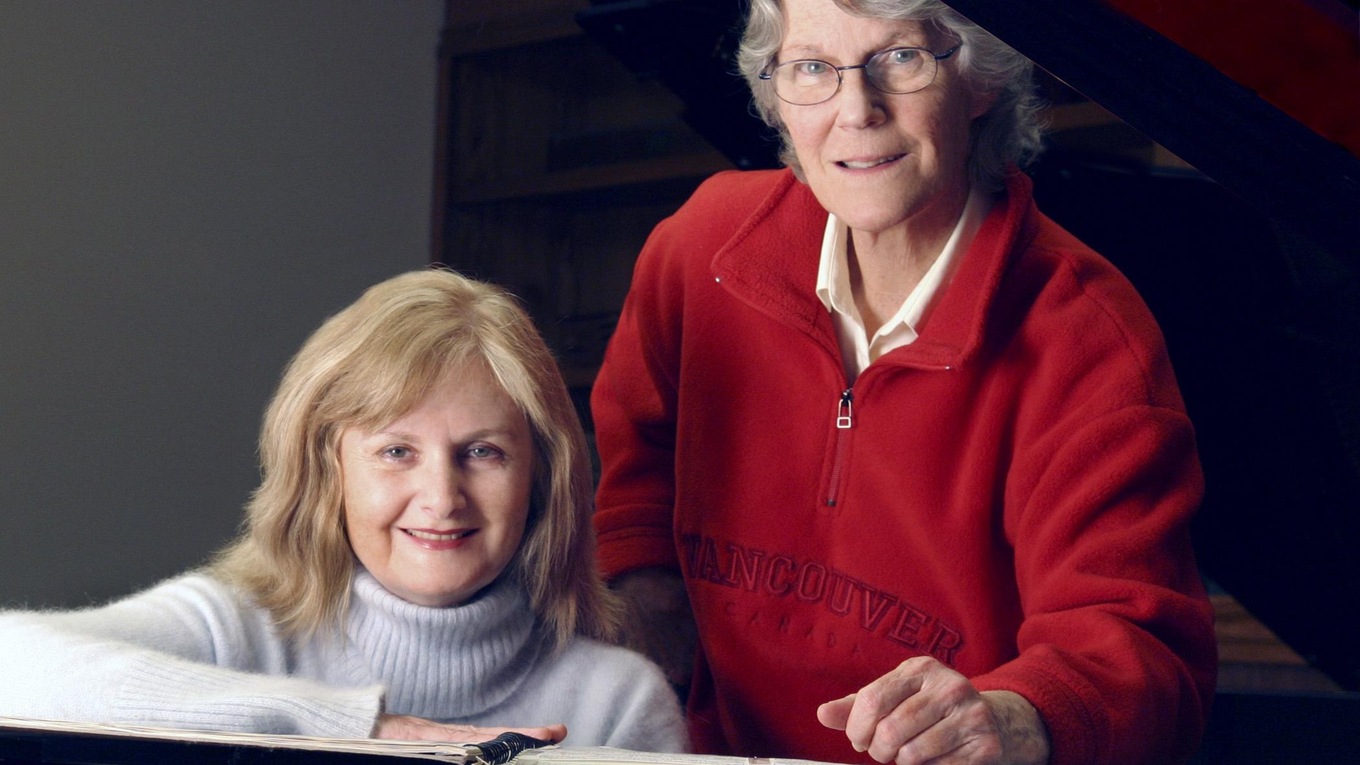"We were friends," says Christina Petrowska Quilico, fondly.
She was speaking to CBC Music recently about Soundspinning, her latest album devoted to the solo piano music of the late Ann Southam.
Of course, "friends" is a huge understatement. Petrowska Quilico and Southam's acquaintance began professionally and developed into a nearly 30-year complicity that would grace us with a tremendous recorded legacy: Soundspinning is Petrowska Quilico's seventh record of Southam's music. Earlier titles in the project, most notably Glass Houses Revisted and Portrait: Ann Southam (including the complete Rivers), were hugely popular and have almost singlehandedly presented Southam's piano music to the world.
Centrediscs will launch the latest addition to the Petrowska Quilico/Southam catalogue at the Canadian Music Centre in Toronto on Sept. 25. Soundspinning contains rarely heard compositions by Southam, some in the minimalist style we've come to recognize (Stitches in Time), others imbued with jazz touches (3 in Blue), some serenely abstract works (Slow Music), and there's even a piece from the early '60s, Altitude Lake, that betrays Southam's work in the then burgeoning field of electroacoustic music.
We were interested in knowing how Southam's music first came to Petrowska Quilico's attention.
"It was probably 1981. I was pregnant with one of my children and I had a student who was playing one of the Rivers by Ann," she recalls. "She played it for me and I thought, 'Oh, this is really boring.' The piece had no dynamics and the tempo was very slow and the student had put no imagination in it. So, I mentioned to the student, 'Well, it's not quite right.' And she said, 'Oh, you need to speak to Ann.'"
Speak they did, and that initial conversation led Southam to ask Petrowska Quilico to record (for archival purposes) most of the music she, Southam, had written at the time: Rivers and some of the Glass Houses.
"Because I was waiting to give birth, I thought, 'Well, I'm not doing anything right now. This is a good opportunity.'" So, she set to work.
'Do what you want with my pieces'
"It took me hours to get through the repertoire at her tempo. I thought, 'This is moving at a glacial pace. This is not Rivers to me,'" Petrowska Quilico remembers.
"I had the fortune to have been working before that with [Pierre] Boulez, and I'd been in [Karlheinz] Stockhausen's class and I had worked with [John] Cage, so I was not too intimidated by composers. And I [had been] a student at Juilliard with Rosina Lhévinne who had taught me all the great Romantic repertoire, and I had always been wearing the two hats, so I thought, 'I'm going to speed this up.' Not the slower ones, but the fast ones. So, I called Ann up and I figured, well, I'm so pregnant, she's not going to yell at me [laughs] and I played it for her and she loved it! So, she said, 'Do what you want with my pieces, I love it.'"
This mutual trust would endure through the next three decades. In the final year of Southam's life, she decided to revise Glass Houses and gave the scores to Petrowska Quilico.
"There were quite a lot of errors with the numbering system — it's all mathematical and I'm pretty picky about that sort of stuff," Petrowska Quilico reflects. "So, I met with her not too long before she passed away and I said, 'Um, can you help me with this?' And she said, 'No, I trust your musical judgement completely.'"
Petrowska Quilico played the revised Glass Houses for Southam before she died. "I played No. 13, and she said, 'Oh my God, I don't remember being so moody and broody, I love it!'"
Their friendship also afforded moments of comic relief in the midst of all the hard work they were doing.
"When I was recording Rivers, she came over to the house. I'm a big animal lover and I had a little pug, and Ann was sitting on the floor with the big Rivers score spread all over. And of course my little pug was only a couple of months old and was being paper-trained at the time. Somehow the pug escaped and ran straight to the paper, looked at Ann and promptly peed all over her score. [Laughs] So, the two of us were tearing at the score and Ann — oh, she was so witty — she turned around and said, 'I hope that's not a comment on my music.'"
'Controlled energy'
Petrowska Quilico recalls an important lesson she learned early on as a student at Juilliard: "I was playing Rachmaninoff's Piano Concerto No. 3 and I was so proud of myself for getting all the notes and everything. But Rosina Lhévinne [said] the best performances didn't have all the right notes, but had this unseen electrical energy and pulse that should go from the beginning to the end — it's all about the long line.
"And I don't feel that the Southam is too different because the fast stuff is really virtuosic, and you need to control it. You can't go wild, you can't think about it, it's got to be this controlled energy. You need to use your breath to create that flow and fluidity in the performances, while controlling all the nonstop volume of notes that are pretty difficult. So, you need to be calm and energetic at the same time."
At the other end of the spectrum is Slow Music, a set of four pieces featured on Soundspinning that Petrowska Quilico says is a byproduct of Southam's interest in the natural world.
"It's like a drop of water under a microscope. It's really teeming with life," she explains, reminding us that bodies of water held a special fascination for the composer of Rivers. "She captures the textures of the breezes and the flow of clouds across the water — a sparkle of light and the suffusion of shade. She's really getting a sense of lyrical introspection using these minimalist methods of playing, but it allows the mind to relax."
We really owe Petrowska Quilico a debt of gratitude for finding and championing Southam's forgotten works such as Stitches in Time, the set of miniatures that opens Soundspinning.
"Ann and I used to laugh about this. She'd say, 'Ah, you're always rooting around in these pieces that I don't want played because I don't think they're very good!' So, I'd take them out of the vault, so to speak. You know, she was very much involved in promoting women's issues, and this repetitive work that women do, like sewing or working in factories. Anyway, I fell in love with these Stitches in Time — three Sonocycles and eight Soundspinnings — and they are very short, like precursors to Rivers. It's the same kind of writing where you have the right hand and the left hand doing these patterns with hidden motifs that she liked. She would say, 'Every time you play it, I hear different things, which is what it's supposed to be.' They're from 1979 and I love them."

Petrowska Quilico will deliver a lecture-recital on the music of Ann Southam at the 2018 International Piano Symposium in London, England.
To learn more about Soundspinning and Petrowska Quilico's catalogue of recordings of Southam's music, head over to Centrediscs' website.
If you're in the Toronto area, you can attend the Soundspinning launch at the Canadian Music Centre on Sept. 25 at 5:30 p.m. Details here.
Related:
Rodney Sharman: 'I go wherever my imagination takes me'
Marc-André Hamelin: 'This CD almost means more to me than everything I've ever done, combined'

The showcase for Canada's contemporary composers. Incredible works ranging from romantic to modern; adventurous to minimalist. Hear: Marjan Mozetich, Alexina Louie, Ann Southam, Jean Coulthard, R. Murray Schafer, Colin McPhee and more!
